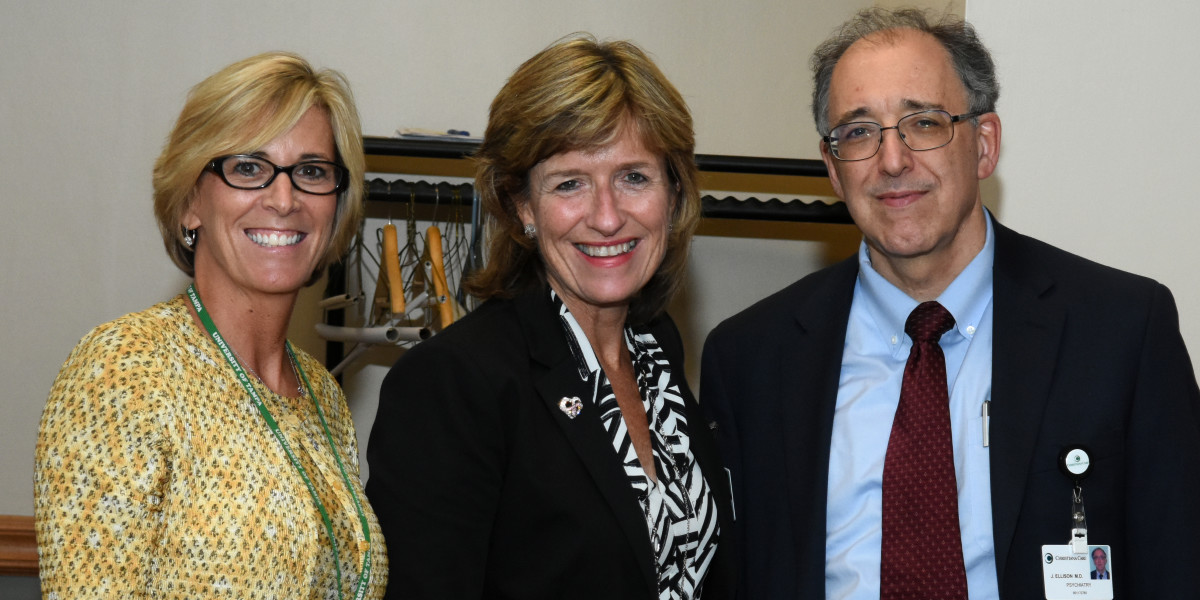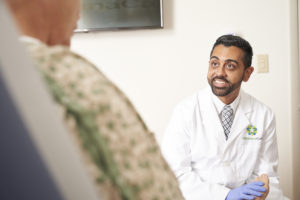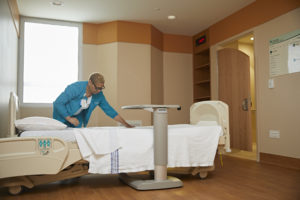For many of the people who attended a screening of the film “Still Alice” sponsored by the Swank Memory Care Center at Christiana Care, living with Alzheimer’s and other memory disorders is a real-life drama. “Still Alice,” starring Julianne Moore, is a dramatic film about a woman facing early onset Alzheimer’s disease, and its impact on the people she loves.
“Memory disorders impact the entire family, not just the patient,” said Mary Beth Transue, LCSW, senior social worker and program manager at Swank. “We’re here to address any questions and concerns you might have.”
Transue participated in a panel discussing after the screening, which included her colleagues James M. Ellison, MD, MPH, The Swank Foundation Endowed Chair in Memory Care and Geriatrics at Christiana Care; Patricia M. Curtin, M.D., FACP, CMD, chief, Geriatric Medicine, director of clinical strategy and community affairs at the Swank Memory Care Center, and medical director of the Acute Care of the Elderly (ACE) Unit; and Jerry Spilecki, a caregiver whose elderly mother has Alzheimer’s disease.
Dr. Ellison noted that Alzheimer’s disease was initially believed to be a disease of younger people. The first diagnosed case was a woman whose first symptoms were seen at age 47. As the disease became better understood, increasing age was identified as the most important risk factor in developing Alzheimer’s disease.
“As many as 40 percent of people over age 85 are affected,” Dr. Ellison said.

The film focuses on Alice, who is 50 when she learns she has a rare, inherited form of early-onset Alzheimer’s. Two of her three children are tested for the gene and one tests positive, meaning there is a 100 percent chance she will develop the memory loss associated with the disease.
One of the attendees was concerned because a parent and two aunts have Alzheimer’s. They developed their memory problems later in life. Does that mean she will, too?
Dr. Ellison explained the average level of risk is only slightly elevated for people who have relatives who were diagnosed with Alzheimer’s later in life, after age 65. He emphasized that physical activity and good nutrition, among the most important tools for optimal brain aging, are healthy behaviors to adopt whether your risk for dementia is normal or increased.
Dr. Curtin noted that Alzheimer’s Disease is the most common cause of memory loss in the elderly, and that there are other types of cognitive disability. One condition, for example, impacts some patients who have undergone chemotherapy or radiation. Some conditions that impact memory, such as depression, thyroid disease and vitamin B-12 deficiency, can be treated and often reversed.
“We see patients at the memory center who have memory impairment of any kind,” she said. “We also are able to rule out memory problems in some cases.”
In the film, Alice loses interest in activities that once gave her joy as her illness progresses. Spilecki, the caregiver on the panel, has had similar experiences with his mother. He encouraged caregivers in the audience to keep their loved ones engaged with life.
“My mom shies away from social life, but if I can get her to church, get her to the picnic, she is fine and enjoys herself,” Spilecki said.
In the film, when Alice is first diagnosed she asks her doctor what she can do to stay as healthy as possible. He tells her to exercise, drink lots of water and make sure to get enough sleep.
“That’s good information,” Dr. Ellison said. “Exercise, hydration and sleep are very important for Alzheimer’s patients. In addition to aerobic exercise, which we usually think of as ‘exercise,’ it’s important to stretch, to engage in strength-building exercises and to practice balance exercises, as well.”
When she first seeks help, Alice acknowledges that she is having difficulty remembering. Transue said that is often the case with people in the early stages. They may notice problems in themselves that others want to see as normal signs of aging.
Later on, the picture changes. “When we ask people if they have a problem in the later stages, they say ‘no,’” she said. “They no longer realize there is a problem.”
At that point, others are very aware of their difficulties and the patient’s caregivers may need support, education and help accessing resources that will assist them in the difficult job of providing care to a person with failing memory.
Medical science has conquered devastating illnesses, and researchers have already made considerable progress in understanding the nature of Alzheimer’s disease. Symptom-reducing treatments already exist. More definitive treatments may be on the way.
“The Swank Memory Care Center is privileged to serve as a resource in the Christiana Care Health System, consulting to patients, caregivers and health care providers in order to help everyone to access the best treatment currently available,” Dr. Ellison said.
About the Swank Memory Care Center
The Swank Memory Care Center at Christiana Care is Delaware’s first and only comprehensive outpatient office for patients with memory disorders and their families.
Our geriatricians, nurse practitioner, social worker, community educator and medical and administrative assistant work closely with specialists, including neurologists and psychiatrists, to provide specialized care. Our staff also assists patients in arranging additional consultations or diagnostic testing as needed, and coordinates follow-up care with other providers.
The Swank Memory Care Center is a collaborative care program of Christiana Care’s departments of Medicine, Family & Community Medicine and Psychiatry.
More than 14,000 people across Delaware are coping with Alzheimer’s disease and other forms of memory loss.



